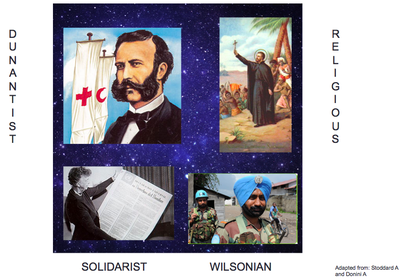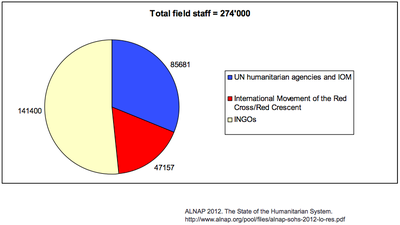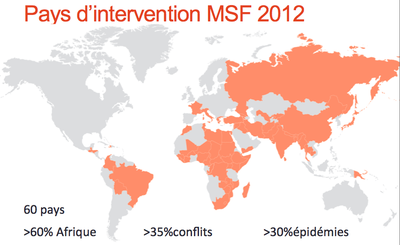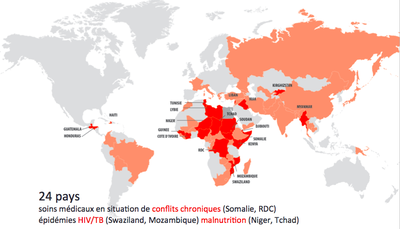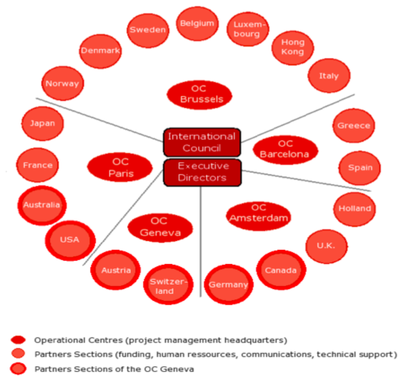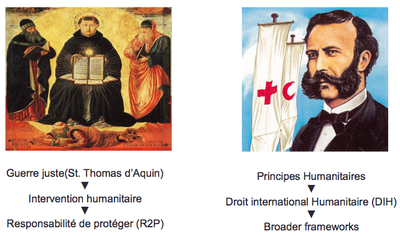Humanitarian action: between action and intervention
| Faculté | Faculté des sciences de la société |
|---|---|
| Département | Département de science politique et relations internationales |
| Professeur(s) | |
| Cours | Critical approaches to international relations |
Lectures
- Introduction to critical approaches to international relations
- Sociology of the discipline of international relations
- Norms in international relations
- Globalizations: definition and situation
- Globalization: circulation between imperialism and cosmopolitan strategies
- Otherness in international relations
- The concept of domination in international relations
- Humanitarian action: between action and intervention
- The concept of development in international relations
- Security and international relations
- Surveillance and international relations
- War and international relations
- War, peace and politics in Africa since the end of the Cold War
- Borders in international politics
- The borders of Europe
- Mobility and international relations
- To conclude the course of critical approaches to international relations
Humanitarian action is a research subject that has been of much less interest to scientific debates and is above all a question of practitioners. Humanitarian aid is difficult to build as an object of research. It is difficult to operationalize theoretical concepts in the case of humanitarian work.
Brief History of Humanitarian Action[modifier | modifier le wikicode]
There is a dilemma and contradiction around the issue of humanitarian aid since there is a surge of charity, but the issue of politics comes into play and humanitarian aid can be instrumentalized.
After the battle of Solferino, Henri Dunant created the Red Cross, which became the ICRC, and laid the foundations of humanitarian law through the Geneva Conventions. When we talk about humanitarian aid as a practice, there is a century of hegemony of the Red Cross, which will be the main actor in humanitarian aid, particularly around the principles of neutrality and impartiality. The ICRC will be criticised in the context of the Second World War because it was aware of the events in the concentration camps with the gas chambers, but in order to be able to keep access for assisted persons and prisoners of war in particular, the ICRC did not disclose the information and took a position.
In parallel with the hegemony of the Red Cross, new humanitarian actors will emerge. From the inter-war period, with the League of Nations, the foundations of a global humanitarian system began to emerge with different agencies such as the Office of the Commissioner for Refugees. With the end of the Second World War and the realization of the need for a world government, the UN will become a fairly central actor in humanitarian aid, with a series of specialized agencies that will later lead to the creation of the Office of the High Commissioner for Human Rights.
With the arrival of the new UN actors, there is the arrival of non-governmental organizations marking a deregulation with a multiplicity of actors making humanitarian aid as an object of research even more complicated. On the other hand, during decolonization, there is a first questioning of humanitarian principles with a more third world approach to humanitarian aid, particularly with humanitarian aid that is more politicized and socialist or closer to the eastern bloc, which wants to question the principle of neutrality, which in the form of criticism would only be a disguised way of imposing Western hegemony. It is an argument of Marxist origin that is influential in the criticism of development theory.
There is a growing success of humanitarian action with more and more resources, more and more actors who have increasingly different conceptions of what humanitarian action is. This brings a moment in the Cold War which is considered a turning point which is the Biafra war which is a province of Nigeria wanting to become independent which has provoked a civil war challenging the international community and humanitarian actors.
It should be noted that monotheistic religions predominate in the construction of what has been a charitable action and what has subsequently become a humanitarian action. Whether for Christianity, Islam or Judaism, it is fundamentally at the heart of Christian charity, of zakat, which is one of the five pillars of Islam. We will see how today what is charitable or humanitarian action resulting from the action of the Church or from a religious action is totally decried comes from there.
The NGO issue actually comes from before the Biafra war. OXFOM, for example, was created during the war that was Oxford's committee against famine to send aid to people suffering from famine in Greece during the Second World War. We can also note Save the children created in 1919.
Biafra is a turning point in the French-speaking world because it was from that moment that some actors found it unacceptable to see that the Red Cross did not denounce what was happening in Biafra. Subsequently, it was discovered that this was manipulated. Biafra was the idea of providing help, but also of testifying and decrying situations that were considered intolerable. In the early 1980s, this whole trend was nothing more than third worldism. Subsequently, Médecin du monde and Aide médicale internationale were created. At one point, we enter a separation between French-style and Anglo-Saxon humanitarian aid. What happens in the late 1960s is to speak out for the voiceless.
With the events in Ethiopia in 1985, there was an awareness of Médecin sans frontières who would leave the country after becoming aware that he had been manipulated. Most of the leaders of MSF and MDU subsequently entered governments. In the early 1990s, with the realization that the State may be failing, these non-governmental organizations must be used to achieve certain objectives in the context of liberalization and the State must be allowed to restrict itself to a few sovereign functions.
The genocide in Rwanda was not anticipated despite the presence of the Red Cross and the United Nations. This was a shock, particularly for the United Nations and NGOs, which has a lack of coordination and cooperation leading to a structuring of humanitarian aid.
Until the Tsunami event, there was a willingness on the part of the United Nations to coordinate humanitarian action with the creation of an Office for the Coordination of Humanitarian Affairs, but this did not work very well leading to United Nations reform. This is seeing the emergence of clusters. At the time of the Tsunami, there is a massive influx of aid, but without the capacity to manage this funding. This is a scandal and we realize that there is a larger world because governments also make history. It is at this point that we emerge from the problem of the 1990s of a binary vision between the State and NGOs.
With the earthquake in Haiti in January 2010, it was a humanitarian "spectacle", from crazy projects to the American army that prevented two MSF planes from landing. A country reconstruction commission is set up under the aegis of Bill Clinton, who decides on the allocation of resources. This is a situation where the health cluster does not take into account the cooperation of other actors. With the advent of the cholera epidemic, this raises new issues.
The Syrian situation has seen the refusal of the ICRC and the United Nations to express themselves by blocking aid from the Damascus government. It was a situation where all areas against the Damascus government had no access to any assistance.
Humanitarian actors[modifier | modifier le wikicode]
The humanitarian nebula[modifier | modifier le wikicode]
Stoddard and Donini focused on the issue of describing humanitarian actors today. The dunantist trend is humanitarian aid based on the principles of neutrality, independence and impartiality; and religious actors. The idea is to distinguish between organizations with a Wilsonian tendency that are part of a realistic approach that helps because there is a transformative agenda and we need to change the regime or work on the causes of the conflict or humanitarian cause.
A distinction must be made. The idea of talking about a nebula is that we are in a relationship with aid that is very different. It is also necessary to differentiate between the short term and the long term. Humanitarian aid often refers to the English notion of "relief" which is there to relieve suffering. The Wilsonian trend is the logic that to effectively help a population, the root causes of conflict must be addressed. In order to improve the situation in a country, it is necessary to improve certain aspects such as the school system or to overthrow the existing regime. It is a tension around the debates within the humanitarian nebula.
Operational humanitarian organizations in 2010[modifier | modifier le wikicode]
There is a whole debate between the United Nations and Médecins sans frontières on the issue of operationality since the United Nations is convinced of their operationality, but in reality it is only reallocating funds they have.
The whole question surrounding the insecurity of humanitarian workers must be put into perspective with the fact that this is a sector that has increased significantly in recent years. A whole series of actors does not appear.
New humanitarian actors[modifier | modifier le wikicode]
Governments and regional organizations such as those in Asia and the Middle East are setting up their own relief programmes. The private sector emphasizes corporate social responsibility. Some companies put funding into humanitarian programs such as the Ikea Foundation. Some organizations have strict funding to avoid being tied to entities involved in certain compromising situations. The armed forces have developed their own backup systems.
A major turning point is taking place at the moment with the emergence by some States of a desire to reaffirm their sovereignty over certain actors.
Presentation of MSF and its principles of action[modifier | modifier le wikicode]
The creation[modifier | modifier le wikicode]
Médecin sans frontières was created in 1971 by journalists and doctors with the idea of creating an organization that would provide medical assistance and testify as a voice for the voiceless. .The organization was founded by a group of journalists and doctors who had been following the Vietnam War. As the war became increasingly unpopular, many medical staff members were laid off. Out of this group, some of them decided to join together to create an independent organization that could provide aid for people in developing countries who are not able to afford care or healthcare. The organization's first purpose was just providing assistance, but it quickly became a voice for the voiceless when it agreed to testify before the world on behalf of victims of war and its members have been a voice for the voiceless since. Doctors Without Borders has an important role as an independent organization that speaks out against war, human rights violations, and foreign intervention.
Principles of action[modifier | modifier le wikicode]
Médecin sans frontières prides itself on being an extremely operational organization that does not fund other actors.
Today, the ICRC is much more vocal than MSF is because it is not always easy to testify when there are teams in the field. Safety is to be balanced with patients and patients' rights.
The Charter[modifier | modifier le wikicode]
The Charter is not true, because certain principles must be put into perspective. The Charter was developed in the 1980s.
- Respect for medical ethics
- Respect for human rights: there is a difference between those who do human rights and those who do humanitarian work. Human rights are organizations that are openly human rights organizations. It is difficult to give evidence and not take part in the International Criminal Court system,
- particularly to give evidence.
- The concern for independence
- A founding principle: impartiality
- A spirit of neutrality
- Accountability and transparency
- A volunteer organization
- An associative operation
Today, there is a tendency to abandon questions of neutrality, particularly in the context of Syria. In Israel and Palestine, Israel criticizes for not working in Israel. The answer is that Israel has all the infrastructure and personnel necessary for its medical sufficiency.
Countries of intervention in 2012[modifier | modifier le wikicode]
Médecin sans frontière en Suisse[modifier | modifier le wikicode]
MSF's movement in figures[modifier | modifier le wikicode]
Today, there are 8 million consultations with 445,000 hospitalizations and 73,000 surgical operations. It is also 30,000 employees in more than 60 countries with a budget of 1 billion euros, including 4.5 million donors and 89% private funds.
MSF CH's financial resources[modifier | modifier le wikicode]
In 2012, revenues amounted to CHF 180 million, while there are 211,494 donors. Financial independence offers the possibility of denouncing and making certain speeches.
MSF's areas of activity[modifier | modifier le wikicode]
The areas of activity are:
- assistance to victims of violence;
- assistance to victims of natural disasters;
- disease control[epidemics, HIV/AIDS, tuberculosis, malaria, neglected diseases]:
- fight against malnutrition.
International structure[modifier | modifier le wikicode]
Some principles of action[modifier | modifier le wikicode]
There is a rejection of the instrumentalization of humanitarian action with clear limits between military and humanitarian action. On the other hand, the three axes are independence, neutrality and impartiality in relation to political, religious or economic powers.
The question of the perception of the limits of MSF's actions highlights that MSF does not do everything. Humanitarian principles must be translated into practice during assistance operations, as it is respect for these principles that guarantees humanitarian organizations the right to be present on the ground during armed conflicts in accordance with the Geneva Conventions. There is a tension between the principles of action and action on the ground.
Humanitarian dilemmas[modifier | modifier le wikicode]
humanitarian intervention VS. humanitarian action[modifier | modifier le wikicode]
The question of humanitarian intervention is informed by the notion of just war leading to the idea of the responsibility to protect. It is essential today to have access to populations if a government does not help them, posing a number of problems in the application of these principles. In the case of Libya, the humanitarian principles of neutrality, impartiality and independence, but to which it is also possible to add the humanity that the ICRC indicates in its principles of action, give rise to the principle of humanitarian intervention. Instead of responding with bombardments, why not give refuge to people fleeing conflict.
We have to see that we are dealing with a typically vague object that is part of humanitarian issues. We are faced with completely different good faith conceptions of humanitarian aid. The point of view of Médecin sans frontières is a rather purist point of view. That is, from the moment we are in a totally conceived state. From the moment we are in a totally different conception, we will have to deal with totally different practices. In a Duntian position, as soon as we are facing state-funded actors. From the moment we enter a more interventionist vision, there will be a problem with the issue, particularly military interventions. Working with the military is not only that the military is allegedly manipulating humanitarian aid workers.
The problem today is that we are talking about humanitarian war, humanitarian intervention, humanitarian action or humanitarian crisis and it is getting out of hand. For example, the conceptualization of failed states has been used to justify military and humanitarian intervention in Somalia.
Legitimacy VS. Sovereignty[modifier | modifier le wikicode]
Legitimacy is not to be taken for granted. The question is whether and under what conditions can and cannot the sovereignty of a State be challenged. There may be a sense of a two-tiered approach and the use of R2P when it serves the interests of NATO and the United States. The principle of "sovereign equality" is recalled in the Charter of the United Nations in Article 2. The sovereignty of a State is based on the exclusive power it exercises over its territory and its nationals. This leads to a number of ambiguities in humanitarian practice between the right of interference and the Responsibility to Protect[R2P].
« Regime change (its moral legitimacy and political practicality) is the ghost at the banquet of humanitarian intervention »
— D. Rieff
It is difficult to talk about the responsibility to protect without ignoring the idea of regime and political system change.
On the question of sovereignty, we must look back at the history of the emergence and transformation of the concept of sovereignty and how we came to intervene in the name of international law or in the name of humanitarian intervention by challenging the notion of sovereignty. In international relations, the State and its corollary, sovereignty, are central. From the 1990s onwards, the fact that it was possible to intervene in a country without the consent of the government of that country was a revolution in international relations. Sovereignty, especially after decolonization, is a central concept, especially in the Charter of the United Nations, where the principle of equality is enshrined, namely, that all sovereign countries are equal among themselves.
There is a shift from the end of the Cold War when sovereignty is no longer considered an inalienable right, but sovereignty would become a matter of responsibility. If a regime does not take good care of its people, the international community would have the right to change that regime. This type of approach, described as liberal, will have on the one hand people with a Wilsonian tendency in order to transform societies and improve the well-being of populations. This type of argument will raise a whole series of criticisms. There is an imperial criticism, that is, we will choose to intervene in certain countries for reasons of interest, and there is a purely humanitarian voice on this subject. There is a real criticism within the humanitarian community.
A humanitarian space[modifier | modifier le wikicode]
Three conceptions diverge:
- For Médecin sans frontières, the humanitarian space does not exist as such, because it is rather a symbolic space based on independence to assess the needs of populations, which is rarely the case in some conflict zones.
- for the ICRC, the design is based on the Dunant pyramid. The idea is that the basis of this pyramid is international humanitarian law, on which the principles of neutrality, impartiality and independence are based, leading to the principle of humanity as a final goal. Humanitarian space is made up of the three principles that create humanitarian space.
- for the United Nations, it is a humanitarian operational environment. It is paradoxical to see the United Nations talking about an independent humanitarian space, because a set of joint political and humanitarian missions has been set up. In Somalia, there is a political mission aimed at transforming the regime, destroying the Shebab militia and at the same time doing humanitarian work. The same problem arises in Iraq, which poses a problem of readability.
In the humanitarian nebula, we see actors with different perspectives. From the point of view of a lunatic or Médecin sans frontières, there is a desire to be part of an area that would like to be autonomous, particularly in terms of politics and attempts to divert humanitarian action. On the other hand, we are dealing with UN-type actors where the primary objective is not to maintain the independence and autonomy of this space, but to coordinate as many people as possible in the context of globalization and it is possible to mix actors since any proposal for aid is good to take because the real challenge of humanitarian aid is a real problem of cooperation.
Annexes[modifier | modifier le wikicode]
- Conventions de Genève et commentaires. Comité International de la Croix-Rouge. Url: https://www.icrc.org/fr/guerre-et-droit/traites-et-droit-coutumier/conventions-de-geneve
References[modifier | modifier le wikicode]
- ↑ Page de Stephan Davidshofer sur Academia.edu
- ↑ Page personnelle de Stephan Davidshofer sur le site du Geneva Centre for Security Policy
- ↑ Compte Twitter de Stephan Davidshofer
- ↑ Page de Xavier Guillaume sur Academia.edu
- ↑ Page personnelle de Xavier Guillaume sur le site de l'Université de Édimbourg
- ↑ Page personnelle de Xavier Guillaume sur le site de Science Po Paris PSIA
- ↑ Page de Xavier Guillaume sur Academia.edu
- ↑ Page personnelle de Xavier Guillaume sur le site de l'Université de Groningen
